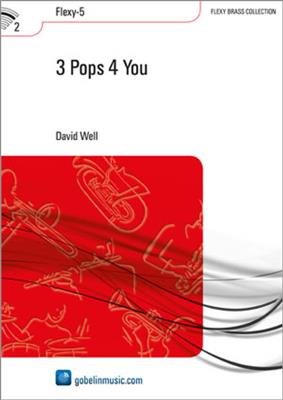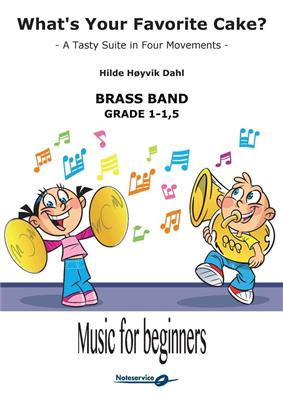Results
-
 £60.99
£60.99Movements - Patrick Millstone
The three sections of Movements demonstrate the concept of motion in all its orms. The March briskly gets the band going (in motion). section 2 (Sarabande) is solemn and melodious (slow motion), and the Allegro con Brio in section 3 forms an energetic conclusion (commotion) to this enchanting and instructive composition by Patrick Millstone.
Estimated dispatch 5-14 working days
-
 £60.99
£60.99Caribbean Sketches - Dagmar Kildevann
Latin Music in three variations. Caribbean Sketches takes the band and audience from the reggae sound of Beach Party, to the siesta Lazy Afternoon and concludes with a rousing finale in Let's dance. Don't forget your sunglasses!
Estimated dispatch 5-14 working days
-
 £76.99
£76.99Weather Report - Albert Dam
The weather inspired Albert Dam to compose Weather Report. The three parts Windy (rock), Misty (ballad) and Sunny (calypso) want to make us believe that the weather will be changeable. Stable or not, the music is solid as a rock.
Estimated dispatch 5-14 working days
-
 £76.99
£76.99Olympic Dream - Andreas Ludwig Schulte
The world's most important sports event inspired Schulte to compose a magnificent new concert piece. In three parts he successively describes the opening ceremony (musical entry of the athletes), the hymn for the winner (an alluring ballad), and the party following the closing ceremony (rock party) during which all tensions disappear. Enter the world of the Olympic Games and enjoy!
Estimated dispatch 5-14 working days
-
 £60.99
£60.993 Pops 4 You - David Well
A Pop Festival in three parts: 1. Purple Pop - Great heavy rock with some modern sound here and there. Attention to the syncopation! 2. Pink Pop - A dreamy ballad with an open ending. 3. Plastic Pop - Finale with heavy percussion!
Estimated dispatch 5-14 working days
-
 £54.99
£54.99Heavy Stuff - David Well
The drummer in the spotlight. A heavy piece with a fat heavy beat. In three sections. Great for the lower sections and youth bands.
Estimated dispatch 5-14 working days
-
 £69.00
£69.00First steps on stage - Peter Goosensen
First steps on stage' is especially intended for beginning wind orchestras. This piece can be used to playfully master music making in an orchestra or ensemble. The composition consists of three parts that together provide a varied and attractive composition.
Estimated dispatch 5-14 working days
-
 £105.20
£105.20Hymne til gleden - Ludwig van Beethoven
Schiller's text of 1785 was partially used by Beethoven in1824 when he did finish the 4th movement of his 9th Symphony. The melody has later been used in very many contexts. As the anthem of the European Union, a lot of movies (A clockwork Orange, Die Hard, etc.), music to video games, as the anthem of Rhodesia, as rebel song in Chile and by FIFA. Therefore, it can be used in most settings This Young Band arrangement focuses on the main melody. In the original, the B part is repeated in each variation, but to get three variations (out of four), this repetition has been cut. The first variation should be played as soft as possible, but still with a nice sound. Crescendo to forte(f) and going back to pp should be as a surprise.
Estimated dispatch 5-14 working days
-
 £115.60
£115.60Easy Peasy - Hilde Høyvik Dahl
This suite is written for beginning band at grade level 1. It consists of five short movements of various style. You may perform the movements as single pieces. The composition consist basically of three voices to make it playable also for smaller ensembles.
Estimated dispatch 5-14 working days
-
 £111.70
£111.70What's Your Favorite Cake? - Hilde Høyvik Dahl
This suite is written for beginning band at grade level 1-1,5. It consist of four short movements in various style. In one of the movements, the musicians are introduced to time signature.The suite in its entirety is a great concert piece, but you may also play the movements as single pieces.The composition consists basically of three voices to make it playable also for smaller ensembles.
Estimated dispatch 5-14 working days
